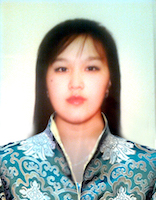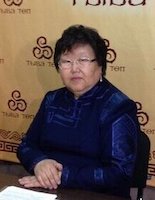The vocabulary of protecting children’s lives in Tuvan language
DOI:
https://doi.org/10.25178/nit.2020.1.8Keywords:
Tuvan language; Tuvans; culture of childhood; Tuvan culture; vocabulary; Shamanism; protection of children’s lives; Tuva; Tuvans of Mongolia; Tuvans of ChinaAbstract
In Tuvan vocabulary of belief an important place belongs to the names of the rites and traditions linked to protecting children’s lives. This vocabulary group has never been studied before. For the sources of our analysis, we used ethnographic studies of Tuvan culture, dictionaries of Tuvan language, literary texts, and fieldwork materials collected by the authors in their 2014-2017 expeditions to Mongolia and China.
By its origin, the vocabulary used in the rites of protecting children’s lives is almost always Tuvan with few exceptions. Some dialectal words are also in use. With the demise of the rite among Russian Tuvans, the phrase “urug syrtyyn shygzhaar” (the burial of the placenta) has been classified as obsolete. At the same time, a large part of this lexic group has returned to active use in contemporary Tuvan, although it is still marked as obsolete in dictionaries. This clearly reflects the socio-political transformations in the life of Tuvan people which happened throughout the past century. We can witness a living process of changing the structure of the meaning of a number of words.
References
Bavuu-Surun, M. V., Shirobokova, N. N., and Samdan, A. M. (2018) The Nomenclature of Medicinal Plants of Tuva in Dictionaries. The New Research of Tuva, no. 4 [on-line] Available at: https://nit.tuva.asia/nit/article/view/805 (accessed: 10.09.2019). DOI: 10.25178/nit.2018.4.2
Vainshtein, S. I. (1972) Istoricheskaia etnografiia tuvintsev. Problemy kochevogo khoziaistva [Historical Ethnography of Tuvans. Problems of nomadic economy]. Moscow, Nauka. 314 p. (In Russ.).
Darzha, V. K. (2007) Tainy mirovozzreniia tuvintsev-nomadov [Secrets of the Tuvan nomad worldview]. Kyzyl, Tuvan publishing house. 255 р. (In Russ.)
Darzha, V. K. (2009) Traditsionnye muzhskie zaniatiia tuvintsev [Traditional Tuvan male pursuits]. Kyzyl, Tuvan publishing house. 592 р. (In Russ.)
Iskhakov, Ph. G. and Pal’mbakh, A. A. (1961) Grammatika tuvinskogo iazyka. Fonetika i morfologiia [A grammar of the Tuvan language. Phonetics and morphology]. Moscow, Vostochnaia literature Publ. 472 p. (In Russ.).
Kenin-Lopsan, M. B. (2006) Traditsionnaia kul'tura tuvintsev [Traditional culture of Tuvans]. Kyzyl, Tuvan book publisher. 232 p. (In Russ.).
Kenin-Lopsan, M. B. (1994) Tuvinskie traditsii [Tuvan traditions]. Moscow, Troika. 352 p. (In Russ.)
Potapov, L. P. (1969) Ocherki narodnogo byta tuvintsev [Essays on the national life of Tuvans]. Moscow, Nauka. 402 р. (In Russ.)
Simchit, K-M. A. (2009) Leksika shamanizma v tuvinskom iazyke [Vocabulary of shamanism in the Tuvan language]: Diss. … Candidate of Philology. Kyzyl. 174 р. (In Russ.)
Suvandii, N. D. (2011) Tuvinskaia antroponimiia [Tuvan anthroponymy]. Kyzyl. 208 р. (In Russ.)
Sundui, G. D. (2009) Mir detstva kochevoi Azii: opyt dukhovno-nravstvennogo vospitaniia [The world of nomadic Asia's childhood: the experience of spiritual and moral education]. Kyzyl, IRNSh. 168 p. (In Russ.)
Tatarintsev, B. I. (2000) Etimologicheskii slovar' tuvinskogo iazyka [An etymological dictionary of the Tuvan language]. Novosibirsk, Nauka. Vol. I: A–B. 339 р. (In Russ.)
Tatarintsev, B. I. (2002) Etimologicheskii slovar' tuvinskogo iazyka [An etymological dictionary of the Tuvan language]. Novosibirsk, Nauka. Vol. II: D, E, I, I. 386 р. (In Russ.)
Tolkovyi slovar' tuvinskogo iazyka [An explanatory dictionary of the Tuvan language] (2003) / ed. By D. A. Mongush. Novosibirsk, Nauka. 599 р. (In Russ.)
Tolkovyi slovar' tuvinskogo iazyka [An explanatory dictionary of the Tuvan language] (2011) / ed. by D. A. Mongush. Novosibirsk, Nauka Publ. Vol. II. К–С. 798 p. (In Russ. and Tuv.)
Tuvinsko-russkii slovar' [A Tuvan-Russian Dictionary] (1968): c. 22000 words / ed. by E. R. Tenishev. Moscow, Sovetskaia entsiklopediia. 465 p. (In Russ. and Tuv.).
Khomushku, O. M. (2006) Religioznyi sinkretizm u narodov Saiano-Altaia [Religious syncretism among the peoples of Sayan-Altai]: Diss. … Doctor of Philosophy. Moscow. 299 р. (In Russ.)
Tsetsegdar', U. (2003) Obraztsy fol'klora i rechi Kobdoskikh tuvintsev [Samples of folklore and speech of the Kobdo Tuvans]. Kyzyl, Tuva book publishing house. 191 р. (In Russ.)
Yusha, Zh. M. (2018) Fol'klor i obryad tuvintsev Kitaya v nachale XXI veka. Struktura. Semantika. Pragmatika [Folklore and ritual of China’s Tuvans in the early 21st century: sctructure, semantics, pragmatics]. Novosibirsk, Nauka. 400 p. (In Russ.).
Published
How to Cite
Oorzhak S. S. and Bavuu-Surun M. V. The vocabulary of protecting children’s lives in Tuvan language. The New Research of Tuva. 2020, № 1. URL: https://nit.tuva.asia/nit/article/view/908 (access date: ...). DOI: 10.25178/nit.2020.1.8
Issue
Section

Author(s) license holder(s) grant rights for their work to the journal (grantee of a license) under the simple non-exclusive open license in accordance with Art. 1286.1 «Open license for a research work, work of literature or fine arts», Civil Code of the Russian Federation.
New Research of Tuva publishes articles under the Creative Commons Attribution-NonCommercial license (CC BY-NC).
Since it is an open license, author(s) reserve the right to upload the article to their institutional repository, submit it to another journal (if it allows republications), or republish it on their own website (in full, or in part).
However, several conditions apply here:
a) The republished version must always contain the name(s) and affiliation(s) of the author(s), the original title and the hyperlink to the original version on the New Research of Tuva website;
b) It must be in open access, free of charge, and no category of readers must be in any way whatsoever advantaged over general readership.
c) should the contribution be submitted elsewhere by its author(s) without substantial modification (30% or more of original text unchanged), the body of the article should contain a disclaimer that the original version was published in New Research of Tuva (with a link to the respective page)
The CC-BY-NC is a non-revocable license which applies worldwide and lasts for the duration of the work’s copyright.










